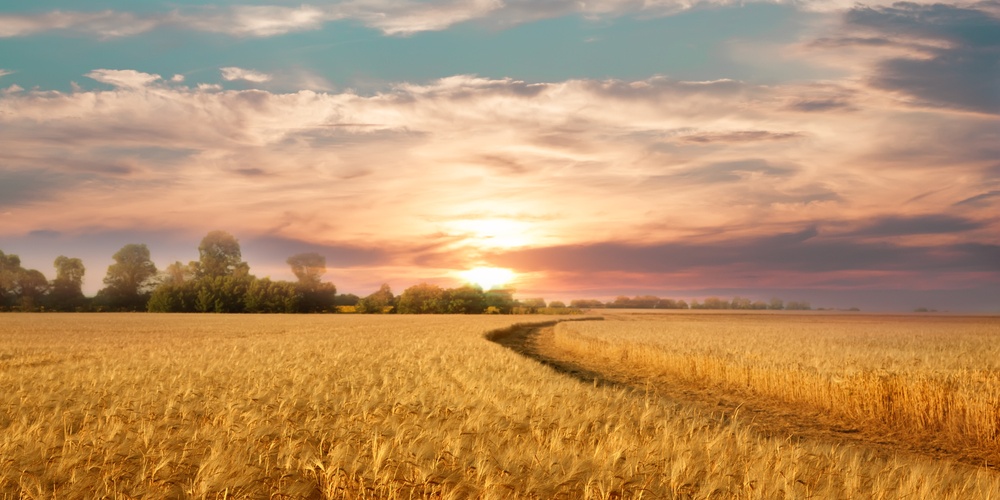
“You shall count seven complete weeks from the day following the Shabbat from the day you brought the omer as a wave offering seven complete weeks they shall be...on the 50th day you shall present a new meal offering to the Lord" (Vayikra 23:15-16).
The holiday of Shavuot - marking the beginning of the wheat harvest - lacks its own independent date, its celebration linked to Pesach. We tend to think of the linkage between physical and spiritual freedom, the means and the ends if you like. The purpose of the Exodus was to receive the Torah and Shavuot is the completion of Pesach. While this is undoubtedly true, nowhere is this to be found in the Torah itself. Our Talmud Sages were not even certain as to the exact date we received the Torah. In any event such is irrelevant as that first covenant was broken with the building of the golden calf. The date we received the Torah that we observe today was Yom Kippur, not Shavuot. Shavuot in the Biblical text is purely an agricultural holiday, a one-day pause in the middle of the busy summer season to express our gratitude to G-d.
The calendric dependence of Shavuot on Pesach raises the question of why we in the Diaspora must observe a second day of Yom tov for Shavuot. The second day of Yom tov was instituted due to the uncertainty over which day had been declared Rosh Chodesh, the first of the month. While it might have taken more than two weeks to find out this information – hence the need for an extra day of Pesach - seven weeks later the actual date of Rosh Chodesh Nissan and Pesach was well-known. Hence there was never any doubt as to which day was actually Shavuot. It was 50 days after Pesach and there is no need for a second day of Shavuot.
The whole notion of the second day of Yom tov has other anomalies. If we are going to be consistent we should have a second day of Yom Kippur as the Diaspora communities were, at the tenth of the month, still unsure as to the exact day of Rosh Chodesh. And if Yom Kippur is only one day surely there is no reason to have two days of Sukkot five days later. Furthermore, Rosh Hashanah is observed for two days even in Israel just like in the Diaspora”.
While individually we could offer answers to each one of these questions – it would be too difficult to fast for two days of Yom Kippur, for instance – the fact that there are more exceptions to the rule than applications of the rule itself is telling. Surely the rule needs some re-examining. And with the establishment of a fixed calendar the entire notion of a second day should be unnecessary. It should come as no surprise that one of the earliest innovations of the Reform movement was the abolition of the second day of Yom–Tov. Why is it that the halacha is so insistent on maintaining the second day and doing so in such an unusual fashion?
As we are in the period between Yom Ha'atzmaut and Yom Yerhushalayim perhaps we can offer a “Zionist” approach. When all is said and done what we have is the three pilgrim festivals of Pesach, Shavuot and Sukkot with an extra day in the Diaspora whereas the Yamim Noraim – Rosh Hashanah and Yom Kippur - are celebrated on the same days both in Israel and abroad.
It is Pesach, Shavuot and Sukkot that celebrate our ties to the Land of Israel. Chag haAviv, Chag HaKatzir and Chag HaAssif celebrate the agricultural cycle of the land of Israel. We perform the mitzvah of aliyah l’regel, travelling to Jerusalem together with thousands of other Jews. These are the nationalistic holidays of the Jewish people and as Rav Shimshon Raphael Hirsch points out they are the only ones mentioned in Sefer Devarim – the book about preparing for entry to the Land of Israel. It is as if Jews living in the Diaspora need an extra day to begin to appreciate the meaning of these days – because living outside of Israel we cannot fully observe them. The extra day makes clear the qualitative distinction between life in Israel and life in exile.
The Yamim Noraim, on the other hand, are holidays that concentrate on our personal relationship to G-d, where we focus on self-evaluation and improvement. In our need for tehsuva there is no difference where we reside; Yom Kippur is Yom Kippur.
Wherever we may live, we need to reflect, repent and resolve to do better. But only those living in the Land of Israel can fully appreciate and participate in building the land that "the Lord, your G-d, looks after; the eyes of Lord your God are always upon it, from the beginning of the year to the end of the year" (Devarim 11:12).



